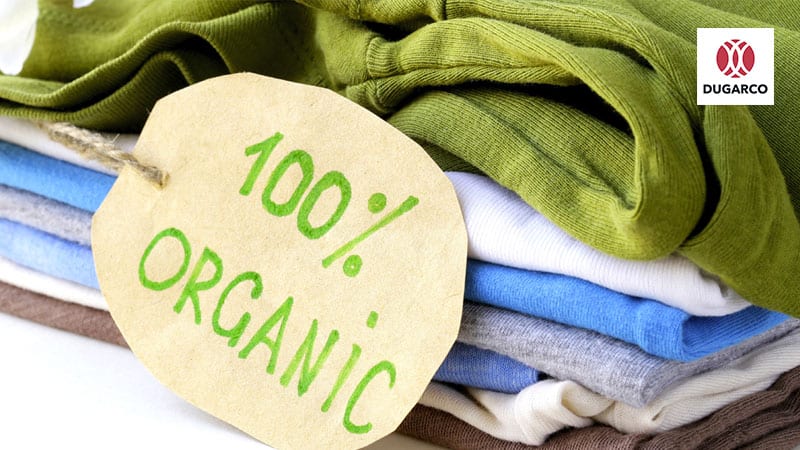Fashion trends change rapidly, so businesses must know how to grasp them and have an appropriate strategy. Sustainable clothing manufacturers are working together with many famous domestic and international fashion houses to affirm current fashion trends and the awakening of the global apparel industry. In this article, Dugarco wants to introduce you to fashion sustainability and how to find the best eco friendly apparel manufacturers today. Watch now.
>>>> READ NOW: Vietnam clothing manufacturers high quality and reputable products
1. What is eco friendly clothing manufacturers?
When it comes to sustainable fashion people talk about ethical manufacturers. When the influence of fast fashion has become saturated and entails many environmental consequences as it is today. Environmentally friendly fashion follows sustainable trends based on many factors to evaluate. To build sustainable clothing manufacturers, factories must ensure human factors, business ethics, and earth-related factors.
When producing clothing, your eco friendly apparel manufacturers must be responsible for society and people. The philosophy required of sustainable fashion:
- Business Ethics: Employees are fully and fairly paid. They are working according to EU standard hours. Create the best working conditions, rest, eat well, social insurance, and full health.
- Sustainability in production: Production must ensure the criteria or certification related to environmental friendliness and environmental protection.

>>>> LOOKING FOR MORE INFORMATION: A prestigious fashion design studio in Vietnam, a good price
2. The importance of environmentally friendly production today
Certain green production standards will bring many benefits to the environment and human health. Eco friendly clothing manufacturers will minimize energy and water optimally while reducing harmful emissions and harmful chemicals. To better understand the role of sustainable production, let’s take a closer look at these benefits below!
2.1. Resource-saving and efficiency in production operations
Every clothing manufacturing process affects the environment. However, most sustainable clothing manufacturers have worked hard to minimize their negative impact on the surrounding environment. They rely on measures of reusing waste, collaboration, education, and deploying new, innovative materials. They use environmentally friendly fibers that save water and consume less energy. Besides, they produce their clothes locally for an overall smaller environmental footprint.

A good example is the sustainable manufacturer NatureUsa. This manufacturer uses completely environmentally friendly materials with the least amount of energy. Specifically, the energy they use is low on average: 65% less water, 50% less electricity, 40% fewer chemicals, 30% less natural gas, and 50% fewer emissions. Switching to production with renewable energy sources such as wind or solar also helps manufacturers save energy and better protect the environment. Sustainable technology development ensures that energy is produced most efficiently. This option is considered an effective optimal solution for sustainable clothing manufacturers for small businesses.
>>>> CLICK NOW:
- Vietnam jacket manufacturers prestige, quality, cheap price
- Oeko-tex 100 standards certification | Definitions and benefits
2.2. Reducing impact on the environment
The most obvious benefit of the sustainable industry is the reduction of negative impacts on the surrounding environment. Most clothing manufacturing businesses turn to eco-friendly development to uphold their responsibility and ethics. This ensures a cleaner and safer environment. Moreover, sustainable production development aims to reduce emissions into the environment and conserve water, energy, and natural resources.

2.3. Improve health and safety in production
By being a sustainable producer you can control the reduction of water, energy, waste, and harmful emissions into the environment. As a result, this reduction in carbon emissions helps to ensure the health of employees is safer. Thanks to that, the working efficiency is better, and production capacity and working spirit are also significantly improved.
2.4. Get incentives from governments
In addition to saving resources and costs, sustainable production can also boost opportunities for tax credits, subsidies, and other incentives at the state and federal levels. Clothing manufacturers are eligible for a free assessment from the Department of Energy’s Industrial Assessment Center. Being a sustainable producer can help you improve your competitiveness for government project contracts. Because most government contracts only give preference to sustainable producers.

3. Prestigious sustainable clothing manufacturers and companies
Not only big oil companies and smog from coal mines but fast fashion is also one of the central polluting industries in the world. Both overproduction of clothes and garments are harmful to our planet and harm farmers and manufacturers due to chemicals and waste. Since then, many eco-friendly clothing brands men were established to help people perceive, use and contribute to saving the earth’s environment.
3.1 Dugarco brand
Dugarco is one of Vietnam’s leading sustainable wholesale clothing suppliers. And Dugarco is a custom sustainable fashion brand that is a women’s clothes manufactures with 90% organic cotton that meets international standards. All factories are production lines with modern technology, prioritizing quality products, meeting the requirements of quality standards, and producing no pollution. If you represent eco-friendly clothing companies in the United States or you are looking for a place to buy sustainable fashion in Vietnam, be sure to contact Dugarco. The company offers clothing even to B2B & B2C customers, which offers you a wide range of custom clothing finishing services, and is a popular environmentally friendly clothing manufacturer in the world and trusted abroad.

In addition, around the factory’s sustainable and ethical clothing manufacturers – Dugarco, the industrial park focuses on low-pollution, environment-friendly industries. All domestic and industrial wastewater as well as solid waste are classified, collected, and transported to the gathering yard of the industrial park, and then treated according to current regulations. Trees occupy 10% of the parking area, combining trees in the concentrated area with trees along the roads to create beautiful, natural-friendly landscapes throughout the industrial park.
As one of the sustainable clothing manufacturers in Vietnam supply to foreign markets such as the United States, UK, Australia… Eco friendly clothing manufacturing company Dugarco minimizes the environmental impact in the steps of manufacturing process and uses yarns and environmentally friendly materials. The environmentally friendly clothes produced by Dugarco include:
- Shirts and clothes are used with friendly materials, 100% certified organic
- Organic bamboo clothes
- Producing organic cotton t-shirts and shirts
- Supplying all kinds of organic t-shirts to foreign markets
- Eco-friendly clothing for men
- Organic women’s clothing
- Organic short-sleeved shirt, long-sleeved shirt
3.2. Tentree
As a certified B Corp, Tentree upholds the highest standards for people and the planet in its manufacturing process. As the name suggests, this company plants 10 trees for each item purchased and has reached over 70 million trees to date while they have a goal of planting one billion trees by 2030. The perfect outfit for activewear and sunglasses lovers, all made from various sustainable fabrics like organic cotton at eco friendly clothing manufacturing companies Europe in Europe and India by Tentree

- Headquarters: The United States.
- Products: Best For graphic tees, loungewear, and outerwear.
- Sustainable Practices: GOTS Certified B Corp, Climate Neutral Certified, sustainable & recycled materials, WRAP, BSCI, SA8000, or Fair Trade certified ethical production, the environmental initiative.
- Product Range: Adult & children’s apparel, activewear, outerwear, and accessories.
- Price Range: $20 – $100
3.3. Eco-friendly brand Pact
Pact knows that organic production benefits consumers, farmers, and the planet. The brand’s organic cotton clothing uses up to 81% less water than traditional cotton fabrics, avoids the use of chemicals, and is incredibly softer than alternatives. Favorite items are sunglasses and nightwear, designed for day and night comfort, leaving you feeling comfortable and confident.

- Headquarters: 262 Elizabeth Street, New York, NY 10012.
- Products: Best For affordable fair trade basics.
- Sustainable Practices: GOTS-certified organic cotton, Fair Trade Certified factories & practices, eco-friendly packaging, clothing donation program.
- Product Range: Adult & children’s apparel, underwear, outerwear, sleepwear.
- Price Range: Over $10.
3.4. Organic Basics
Organic Basics knows that the fashion industry can be a dirty place. And, the brand wants you to look, feel and act as cleanly as possible with their high-quality organic eco-friendly clothing, including the most comfortable sweatshirts, underwear, and bras. This B corporation also gives back to grassroots organizations and activists fighting for climate justice and biodiversity.

- Headquarters:
- Laplandsgade 11, 2300 Copenhagen S, Denmark.
- Pilestræde 35A, 1112 Copenhagen, Denmark.
- Products: Activewear & underwear.
- Sustainable Practices: GOTS Certified B Corp, GOTS certified organic cotton & recycled fabrics, 100 percent eco-certified production, solar & wind energy, gives to 1% for the Planet.
- Product Range: Adult apparel, loungewear, underwear, swimwear, denim, and accessories.
- Price Range: From €27.00.
3.5. Vetta – Eco-friendly clothing brand Affordable
Whether you want to build your wardrobe from scratch or streamline your existing wardrobe, VETTA does it all. The company specializes in creating five-piece themed collections that can be transformed into one month’s worth of outfits. From wrap skirts to reversible miniskirts, VETTA uses organic cotton, linen, Tencel, crochet, recycled polyester, and more. All are sewn in USA, India, and Peru.

- Headquarters: Boston, Massachusetts, United States.
- Products: Best For Capsule wardrobes
- Sustainable Practices: GOTS Certified sustainable & upcycled fabrics, responsible factories, partially solar-powered, recycled packaging.
- Product Range: Women’s apparel, capsule wardrobes.
- Price Range: $100 on average.
3.6. BackBeat Co.
Inspired by California’s skate and skate culture, BackBeat Co. uses low-impact fabrics like hemp and Tencel. This sustainable clothing manufacturers creates tops, bottoms, underwear, outerwear, and more that you can wear while away on the beach. The company also ships from its Los Angeles studio using biodegradable or recyclable virgin plastic-free packaging. Back Beat’s mission is to help you achieve a comfortable life, so consciously feel at ease.

- Headquarters: 1976 S. La Cienega Blvd #653 Los Angeles, CA 90034, USA.
- Products: Best For Colorful clothing
- Sustainable Practices: Many are made in the USA, with ethical production, GOTS-certified organic cotton & sustainable materials, and recycled packaging.
- Product Range: Adult apparel, activewear, loungewear, sets, and accessories.
- Price Range: $4 – $198.
3.7. Sustainable clothing manufacturers Hass
Hass, which clothing brands are environmentally friendly, comes from the beloved natural bedding company – Avocado, so you can expect the same impressive standards. B Corp makes chic innovative tunics and super soft basics, such as cardigans, joggers, hoodies, tees, and more. They are made with organic and sustainably grown cotton, biodegradable, and alpaca fiber sourced from a regenerated farm in Peru, all handcrafted with non-toxic dyes.

- Headquarters: Hoboken, New Jersey, United States.
- Products: Best For Sleepwear & Loungewear.
- Sustainable Practices: Certified B Corp, Climate Neutral Certified, GOTS certified organic fabrics, eco-friendly packaging, nontoxic dyes, give back, Made Safe certified ethical production.
- Product Range: Adult apparel, loungewear, sleepwear.
- Price Range: $38 – $275.
3.8. Thought Clothing
Thought Clothing has got the goods that eco-friendly clothing is made from hemp, bamboo, and GOTS-certified organic cotton are made with sustainability in mind. Thought Clothing’s products are also commented on high quality with bright colors, stunning knits, and stylish patterns, even if you do not need to wash them after just one wear. Besides, every consumer can buy them as they have reasonable prices.

- Headquarters: Thought, Westgate House, 149 roman way, London.
- Products: Best For Women’s Workwear.
- Sustainable Practices: GOTS-certified organic & recycled materials, eco-friendly & ethical production, plastic-free & recyclable packaging, recycling & donation program.
- Product Range: Adult apparel, sleepwear, underwear, socks, and accessories.
- Price Range: $59.95 – $170.00.
3.9. Boden
When becoming as popular as Boden, the sourcing and supply chain are of prime importance because it has the most significant impact on the environment. Additionally, Boden follows the idea that the company uses sustainable and organic fabrics wherever possible, builds partnerships around the world, and is ethical at every step of the supply chain.

- Headquarters: North Acton, London, England.
- Products: Best For Investment pieces for the whole family.
- Sustainable Practices: Fairtrade production, BCI certified & sustainable cotton, ethical supply chain, give back.
- Product Range: Adult & children’s apparel, swimwear, sleepwear, accessories, shoes
- Price Range: $18.00 – $350.00.
3.10. People Tree
People Tree clothing is not only guaranteed fair trade but is eco-friendly clothing manufacturers UK cheap, organic, and colored with GOTS-approved dyes. The British brand even prints its labels on FSC-certified paper. With vibrant patterns, lovely silhouettes, and high-quality, eco friendly textile manufacturers, these sustainable products are wardrobe staples.

- Headquarters: Studio 112b, Netil House, 1 Westgate Street, Hackney, London E8 3RL, England, United Kingdom.
- Products: Best For UK eco-friendly clothing
- Sustainable Practices: FairTrade Certified pieces, PETA-approved vegan, GOTS certified organic & biodegradable materials, low impact dyes, give-back box.
- Product Range: Women’s apparel, activewear, underwear, sleepwear, accessories
- Price Range: ££–£££.
4. What does it take to become an eco friendly clothing manufacturing company?
Sustainable clothing production means the clothes are produced in an optimized way that has the least effect on the environment. In the production of sustainable fashion at Dugarco in Vietnam, most of the products are used organic cotton and recycled polyester, designed to be reused for a long time, and then recycled in an eco-friendly way. Therefore, this brought the company to be on the list of eco friendly clothing manufacturers.
4.1 Eco-friendly clothing materials
Today, the clothing material used at all eco-friendly apparel manufacturers’ factories is organic cotton and recycled polyester. Because they have sustainability and eco-friendly requirements the fashion industry is interested in today to become an eco-friendly clothing manufacturer. Furthermore, it is reported that 35% of all microplastics – very small pieces of plastic that never biodegrade – in the ocean are caused by washing synthetic textiles such as polyester.

>>>> SUGGEST: 12 types of sustainable fabric & material for eco-friendly clothing
4.2 Transported by sustainable vehicle
Sustainable transport means modes of transportation that are sustainable in terms of their social and environmental impacts. In addition, pollution emissions from vehicles transported from factories to stores are kept as low as possible. Eco friendly clothing manufacturing companies ship the clothes delivered to the store by vehicles that use non-fossil fuels. To display products, clothing stores must also meet standards for the economical use of electricity and water.

4.3 Distributed by sustainable store
Optimization of distribution systems for eco-friendly clothing manufacturers, reusable packaging, and reduced package waste make a big difference. A distribution store has a big impact on a product or service’s ecological footprint and aims for a full-circle supply chain for eco friendly apparel manufacturers
- Sustainable distribution: This includes the entire distribution process from storage, order processing, picking, packaging, truck improvement to delivery to the customer or buyer, and packaging return.
- Optimizing traffic infrastructure: Consider cleaner way, energy-efficient, and flexible transportation modes. Use near-zero-emission trucks, electronic cars, drones, and autonomous cars.
- Sales and marketing: Emphasize green marketing to generate and increase sustainable purchasing by using retail and point of sales for small businesses, and shops,…
- Full-circle supply chain: Think of entire supply chains, value chains, and new business models. Reverse logistics recovers used packaging as well as unsold and end-of-life products that must be processed to make materials and components available for recycling or reuse.

5. How do you find sustainable clothing manufacturers (ethical fashion)?
If you are looking for an eco friendly clothing manufacturing companies but still don’t know where to look for a reputable one, our following quality search tools will help you with this.
5.1 Sustainable networks
Currently, networking sites are quite reputable and are interesting to many people. Two reputable network platforms today can be mentioned as Manufy and Common Objective. The profile information on eco-friendly apparel manufacturers on it is updated quite regularly and is full of information, and of course, all of them are popular and well-known companies. You can find information about big businesses here that suits your needs. They can meet the needs of working conditions, environmentally friendly products, efficient use of energy and water, good recycling, and waste management. All useful information related to sustainability is listed on these platforms.
5.2 Google search
All the information you want to search for is most visible on Google. So if you want to find out information about sustainable clothing manufacturers or sustainable brands in Vietnam, Google is a pretty useful method. This vast search engine is showing more and more quality search results. They involve complex algorithms, and based on these they will output information about sustainable producers for you to choose from. However, you should pay attention to “promotional” URLs – These are sponsored results, so sometimes these results are of lower quality than the organic ones.

This article has shown you how sustainable clothing manufacturers set up and develop their ideas. Eco friendly apparel manufacturers continue to be a goal pursued by the Dugarco creative team for many years to come. The company tries to provide innovative products and other values such as the Professional Sourcing department always updating and seizing the trends. If you have any questions, do not hesitate to contact them the following.
Contact Information:
- Address: No.59, Duc Giang Street, Duc Giang Ward, Long Bien Districts, Hanoi City, Viet Nam
- Phone: 024 3655 7930
- Email: dugarco@mayducgiang.com.vn
- Website: https://dugarco.com/en/
>>>> RELATED ARTICLES:
- 13 brands for men’s eco friendly clothing you need to know
- How to make your fashion brand sustainable with just 9 tips

Dugarco under the talented leadership and guidance of Mr. Hoang Ve Dung has gradually become a large Vietnam clothing manufacturer, supplying clothes for many famous brands from many different countries such as the UK, USA, and Australia.






6 Responses
Its not my first time to go to see this web page, i am visiting this
web page dailly and take pleasant data from here every day.
Can Vietnam clothing manufacturers meet international quality standards?
Yes, many clothing manufacturers in Vietnam are compliant with international quality standards such as ISO and have certifications like WRAP and BSCI. They are equipped to produce high-quality products that meet the requirements of international buyers and retailers.
What types of clothing can manufacturers in Vietnam produce?
Vietnamese manufacturers are versatile and can produce a wide range of clothing including casual wear, sportswear, formal wear, workwear, children’s wear, and fashion apparel. They are adept at working with various fabrics and materials and can manufacture both small and large quantities depending on the needs of the client.